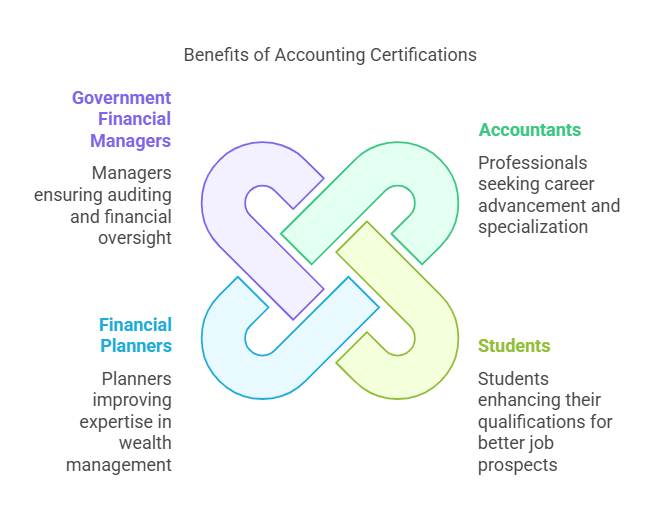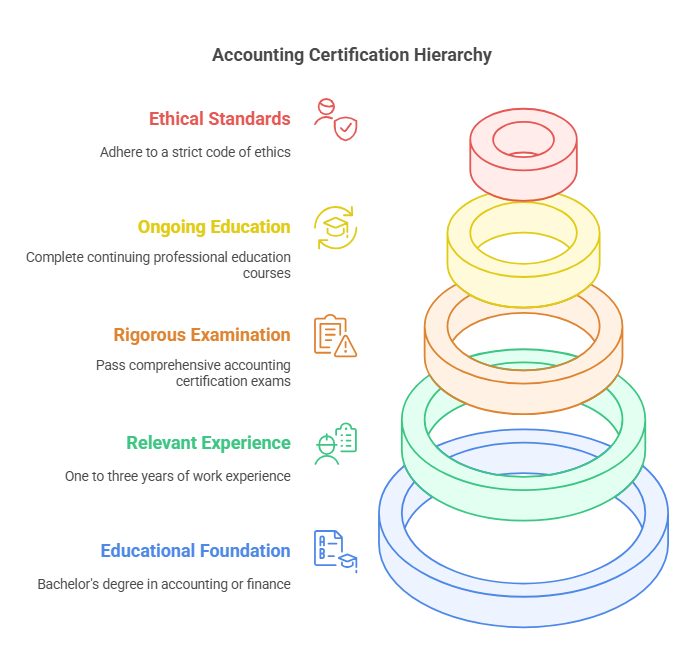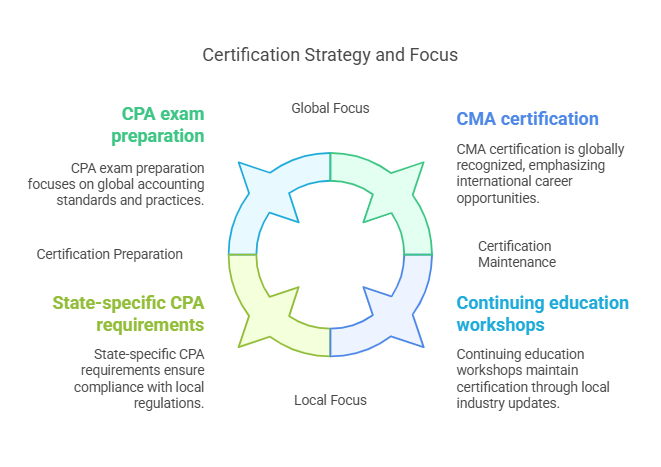Essential Guide to Accountant Certification: Requirements and Benefits
Accounting certifications are professional credentials that validate expertise in specialized areas within accounting, finance, and auditing. These certifications are awarded by industry regulatory bodies, the IRS, or academic institutions. Some accounting roles, such as a Certified Public Accountant (CPA), require specific credentials to practice legally. Other popular certifications include Certified Management Accountant (CMA), Certified Internal Auditor (CIA), and Certified Fraud Examiner (CFE).

Who Can Benefit from Accounting Certifications?
Accounting certifications are beneficial for a wide range of professionals, including:
Accountants looking to specialize or advance in their careers.
Students pursuing an accounting degree who want to enhance their qualifications.
Financial planners seeking to improve their expertise in wealth management.
Government financial managers responsible for auditing and financial oversight.
Beyond career advancement, these certifications, such as medical billing and coding certification from AMBCI, can significantly boost earning potential. For instance, CPAs and CMAs typically earn higher salaries than non-certified accountants. Additionally, employers increasingly prefer certified professionals due to their expertise and adherence to ethical standards.

Types of Accounting Certifications
There are several accounting certifications available, each catering to different specializations:
Certified Public Accountant (CPA): The most well-known certification, required for professionals handling audits, tax filings, and financial reporting.
Certified Management Accountant (CMA): Focuses on financial management, budgeting, and strategic decision-making.
Certified Internal Auditor (CIA): A globally recognized credential for professionals specializing in internal auditing and risk management.
Certified Fraud Examiner (CFE): Equips professionals with skills to detect and prevent financial fraud.
Chartered Global Management Accountant (CGMA): Recognizes CPAs working in business and government financial management.
Certified Government Financial Manager (CGFM): Provides expertise in financial management for government agencies.
Each certification caters to specific career paths and industries, making it important for professionals to choose one that aligns with their long-term goals.

Benefits of Accounting Certifications
Obtaining an accounting certification offers numerous advantages, including:
Higher Salaries: CMAs, for instance, earn an average of $120,000 annually in 2025.
Greater Job Opportunities: Certified professionals have access to better job roles and leadership positions.
Global Recognition: Many certifications are valid internationally, opening up career opportunities abroad.
Enhanced Job Security: Certified professionals are in high demand and more likely to retain their positions during economic downturns.
Increased Expertise: Certifications provide in-depth knowledge and specialized skills that can set professionals apart from their peers.
Certification Requirements and Process
To earn an accounting certification, candidates must fulfill several requirements:
Educational Qualifications: Most certifications require at least a bachelor’s degree in accounting, finance, or a related field.
Work Experience: Candidates must have relevant work experience, typically ranging from one to three years.
Examination: Candidates must pass rigorous exams, such as the CPA exam, which consists of multiple sections covering various accounting principles.
Continuing Professional Education (CPE): Certified professionals must complete ongoing education to maintain their credentials.
Adherence to Ethical Standards: Many certifications require professionals to follow a strict code of ethics.

Preparing for the CPA Exam
The CPA exam is one of the most challenging certification tests, requiring thorough preparation. Here are some effective strategies:
Utilize CPA review courses and online study programs.
Join study groups and participate in online forums for peer support.
Gain practical experience in financial accounting, auditing, and tax planning.
Develop strong time management skills to balance work, study, and personal commitments.
Maintaining Certification with Continuing Education
After obtaining certification, professionals must engage in continuing professional education (CPE) to keep their credentials valid. This includes:
Attending industry conferences and workshops.
Completing online courses and training programs.
Staying updated on changes in financial regulations and accounting standards.
Paying annual renewal fees to maintain certification status.
Choosing the Right Certification
Selecting the right certification depends on career goals, industry requirements, and personal interests. Candidates should:
Assess their long-term career aspirations.
Research certification requirements and associated costs.
Evaluate potential return on investment (ROI) based on salary increases and job opportunities.
Consider whether they want to specialize in a particular area, such as auditing, fraud examination, or government finance.
State-Specific Certification Requirements
Certification requirements vary by state, especially for CPAs. Some states impose stricter educational or experience requirements, so candidates should:
Check with their state’s Board of Accountancy for specific regulations.
Ensure they meet any residency or work experience prerequisites.
Verify if additional certifications, such as CFF (Certified in Financial Forensics), are required for specialized roles.
Global Certification Opportunities
As businesses expand internationally, many accounting certifications now have global recognition. Notable examples include:
The CMA certification, available in over 100 countries.
The CPA credential, recognized in 40+ countries.
The CGMA certification, designed for management accountants worldwide.
These certifications allow professionals to work in diverse industries, including finance, healthcare, and manufacturing.
Impact of Technology on Certification
With the rise of automation and AI, accounting certifications now emphasize technological proficiency. Some key trends in 2025 include:
Increased focus on data analytics and artificial intelligence (AI) in accounting.
Demand for expertise in blockchain technology and cryptocurrency accounting.
Certifications like Certified Information Systems Auditor (CISA) gaining popularity for IT-related financial auditing.
Technology is reshaping the accounting landscape, making digital literacy a must-have skill for certified professionals.
Cost and Financial Aid for Certification
Certification costs vary, but many organizations offer financial aid. As of 2025:
CPA exam fees range from $1,000 to $3,000 depending on the state.
CMA certification costs approximately $2,500, including exam and membership fees.
Scholarships and employer-sponsored programs are available to help offset costs.
Candidates should explore financial aid options offered by organizations such as the AICPA and IMA.
Ethical Considerations in Certification
Ethics play a critical role in accounting. Most certifications require adherence to a code of conduct. Key principles include:
Maintaining integrity and objectivity in financial reporting.
Avoiding conflicts of interest and fraudulent activities.
Upholding professionalism and transparency in all accounting practices.
Certifications like the CFE and CFF focus heavily on ethical considerations, as fraud prevention is a major aspect of financial accountability.

Six Lesser-Known Facts About Accounting Certifications
The CPA exam has a pass rate of only around 50%, making it one of the toughest professional exams.
According to the American Institute of Certified Public Accountants (AICPA), the CPA exam pass rate typically hovers around 50%, making it one of the more challenging professional exams. For more information, you can visit AICPA's CPA Exam Pass Rates.
CMAs in leadership roles, such as CFOs, can earn over $200,000 annually.
The Institute of Management Accountants (IMA) conducts annual salary surveys that show CMAs in executive roles, including CFOs, often earn salaries exceeding $200,000. For details, you can refer to IMA's Global Salary Survey.
The CFE certification is highly valued by law enforcement agencies for forensic accounting roles.
The Association of Certified Fraud Examiners (ACFE) provides the Certified Fraud Examiner (CFE) credential, which is highly regarded by agencies such as the FBI and other law enforcement bodies for its focus on forensic accounting and fraud detection. More details can be found at ACFE's website.
AI-driven auditing tools are now a major component of many accounting exams.
Several professional accounting bodies, including the AICPA, have started integrating questions on artificial intelligence and AI-driven auditing tools in their exam syllabuses, reflecting the growing importance of technology in modern accounting. Sources such as Journal of Accountancy frequently discuss the impact of AI in accounting education and exams.
The CGMA certification is jointly offered by the AICPA and CIMA, making it a globally recognized credential.
The Chartered Global Management Accountant (CGMA) designation is indeed a global credential offered through a partnership between the American Institute of CPAs (AICPA) and the Chartered Institute of Management Accountants (CIMA). More details can be found on the CGMA website.
Several accounting certifications now require sustainability reporting knowledge due to increased ESG (Environmental, Social, Governance) regulations.
Due to the growing importance of sustainability and ESG regulations, accounting bodies like the ACCA, AICPA, and CIMA have started incorporating sustainability reporting into their certification programs. For more details, you can refer to sources such as IFAC's ESG in Accounting.
Frequently Asked Questions (FAQs)
-
The CIA certification is often considered more accessible compared to the CPA due to fewer educational and work experience requirements.
-
Some states allow non-accounting degree holders to sit for the CPA exam, provided they meet specific coursework requirements.
-
Most candidates take 12–18 months to complete the CPA exam, though the full process, including work experience, may take 2–3 years.
-
It depends on career goals. CPAs focus on tax and auditing, while CMAs specialize in management accounting and corporate finance.
-
Certifications require renewal through continuing education (CPE) and payment of annual membership fees.
Accounting certifications are essential for career growth, increased salaries, and job security. Choosing the right one can set you up for long-term success in the evolving world of finance and accounting.
